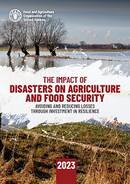Publications
Building on previous work of the FAO on this topic, this report estimates losses caused by disasters on agricultural production over the past three decades and delves into the diverse threats and impacts affecting the crops, livestock, forestry, and fisheries and aquaculture subsectors. It analyzes the complex interplay of underlying risks, such as climate change, pandemics, epidemics and armed conflicts, and how they drive disaster risk in agriculture and agrifood systems at large.
Ahead of this critical conference, explore a selection of FAO publications showcasing our work in tackling climate change.
Increasing the productivity of all livestock systems through innovations for improved feeding, genetics and husbandry practices is essential to contribute to the improvement of agrifood systems leaving no one behind.
In September 2023, FAO organized the first ever Global Conference on Sustainable Livestock Transformation for “better production, better nutrition, a better environment and a better life”. This was an opportunity to engage in dialogues on innovation and pathways to efficiently produce more nutritious, safe and accessible animal source foods with a reduced environmental footprint and contribute to vibrant local and diversified livestock systems that are more resilient to shocks and disruptions. Read more in the series of FAO reports available here.
In recent years, FAO has implemented several measures and initiatives to become more dynamic, efficient and effective in supporting Members and working with partners to transform agrifood systems, making them MORE efficient, inclusive, resilient and sustainable for better production, better nutrition, a better environment and a better life, leaving no one behind.
This series of articles shows how the Organization has changed in different areas.
From 30 November to 12 December, the 28th Conference of the Parties to the United Nations Framework Convention on Climate Change (COP28) will bring together world leaders, policymakers, scientists, and stakeholders from across the globe to deliberate on strategies and commitments that will shape the future of our planet.
For FAO, COP28 serves as a platform for collaborative dialogue, knowledge sharing, and decision-making on the unique role of agriculture and food systems in the fight against climate change. Read more here on FAO work and publications aheasd of COP28.






